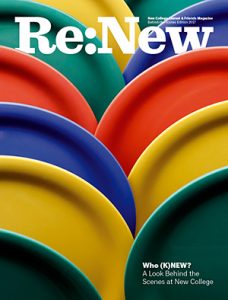Julia Al Akaila. Photo: Michael Barker

A Don’s Life
Residence don Julia Al Akaila discusses the rewards and challenges of the job
New College recognizes the essential role dons play in community building.
“I feed students. I think that’s my reputation—that I feed students.” She laughs, but when you sit across from Julia Al Akaila in her spacious L-shaped don suite on the third fl oor of Wilson Hall, you recognize quickly the truth of that statement— and that the nourishment goes well beyond the sweet treats that regularly emerge from Julia’s oven.
Before graduating in June 2017 with a specialist in Political Science, Julia spent three years as a New College residence don, helping first-years living on campus settle into their new environment and build the kind of community that can ensure their academic and personal success at university. It’s an around-the-clock job, as demanding as it is rewarding and fun. “We’re here for whatever students need. Literally anything,” Julia affirms. In residence, dons typically live on the same hallway as their charges, together forming a ‘house’ and sharing their everyday lives. At New College, which has three integrated residence buildings with a total of 880 beds, a house consists of about 40 to 45 peers. The majority of floors are gender-inclusive, but there are four women-only houses and one exclusively for men. The integrated buildings mean that residence floors, some of which are organized as living learning communities (LLC) focused on specific areas of interest, are located above classrooms or administrative offices on the lower levels. Most residents are NEWtonians, though about 150 living spaces are reserved for students from the professional faculties of Architecture, Engineering, Kinesiology and Music, and 200 for participants in the International Foundation Program (IFP).
After showing newcomers the ropes—and some rules of communal living—when they first arrive, dons spend a lot of their time developing a sense of community through organized activities, at least two per month. Socials describe group activities inside the residence building—think a game night in the common room. Actives, on the other hand, require house mates to get outside, to venture beyond the bounds of their familiar floors to a city ice-skating rink or a theatre, for example. Dons also keep their doors open to any kind of concerns the students may have, whether during scheduled office hours in their extra-roomy suites or during casual visits and conversations. The concerns voiced run the gamut of young adult life on campus: difficulties with class assignments and time-management, requests for help choosing a major or accessing university resources, complaints about a noisy neighbour or a messy roommate, homesickness, troubled relationships, feelings of isolation. Leah McCormack-Smith, New College’s director of Residence and Student Life, speaks of her “constant awe” in the face of dons’ “willingness to provide the assistance and compassion that many students need as they move into a new phase of their life.” To Julia, the task is to walk the fi ne line that separates guidance from prescription, support from judgment. “You’re not there to tell the student what you think is best or what you would do if you were in their shoes. You’re there to listen and figure out what it is that they’re not saying, almost. Or what they haven’t figured out but are hinting at,” she says.
Listening and observing, then, paying close attention— those are the skills a good don practices daily. It is also where the food comes in. As the daughter of a Greek-Canadian mother and a Syrian-Lebanese father who grew up in Greece, Julia understands the importance of placemaking, the power of food and mementoes to create connection and a sense of home, especially in an unfamiliar setting like a big research university, away from almost everything and everyone you know. Words fl ow more easily and honestly with a cup of tea in hand; baked goods bond. Her students acknowledge as much: The nomination statement that led to Julia receiving the newly renamed Professor Yves Roberge Community Builder Staff Award in April 2017 specifically mentioned her treats as part of the inclusive, cheerful and safe environment the dedicated don created on her residence floor.
New College recognizes the essential role dons play in community building, and how that sense of belonging can make all the difference in students’ academic success, personal growth and all-around university experience. So much so, in fact, that in 2014 the college established its commuter don program, based on shared geography, to assist the 80 per cent of students who live off campus. Back in residence, Julia admits that some of the conversations she has with students can be tough, that maintaining the balance between friendship and authority which her role requires takes care, patience and skill. She fell into donning almost by accident at the beginning of her third year when the Office of Residence and Student Life (ORSL) needed to fill a position and approached her. So, would she do it again? The answer is a resounding, beaming yes. Besides taking some Equity Studies courses during her time at U of T— whose focus on untold histories and attention to the nuances of language “absolutely blew” her mind—Julia describes watching and helping people find their own path, and sometimes reinvent themselves, as one of the most transformative experiences of her life. It is one from which she has learned at least as much as she has given back, one she would recommend to her peers without hesitation, not least because of the top-notch training she says New College dons receive prior to starting their positions: “I wouldn’t be where I am today if I hadn’t started donning.”









